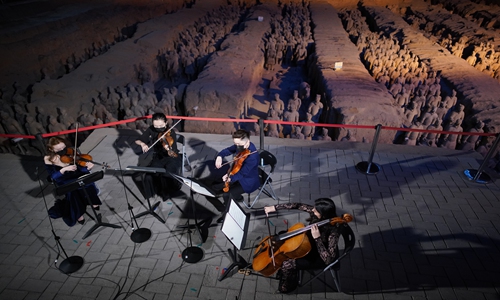Chinese orchestra performs online in bid to bring classical music to more people in China
By Ji Yuqiao Source:Global Times Published: 2020/4/28 17:56:58

Musicians are playing classic music in the Emperor Qinshihuang's Mausoleum Site Museum. Photo: courtesy of the Xi'an Symphony Orchestra
A series of online symphony concerts that combine music with China's precious historical relics are being held in Xi'an, Northwest China's Shaanxi Province, to delight the ears and eyes of audiences from all over the country.The second concert in the series was held in the Emperor Qinshihuang's Mausoleum Site Museum on Saturday, in front of thousands of Terracotta Warriors. The livestream of the concert earned more than 3 million views, Cao Jiwen, brand director of the Xi'an Symphony Orchestra, told the Global Times on Monday.
Musicians from the Xi'an Symphony Orchestra will complete a series of concerts in front of national treasures at the city's various major museums.
Although many netizens were positive about the concert, some viewers commented that they felt it was strange to play Western musical instruments in front of Chinese relics.
"Why didn't they play traditional Chinese musical instruments such as guzhen? Playing violins or pianos in Chinese museums does not seem very harmonious," one netizen commented in a post on the stream.
During an interview with the Global Times, Cao said that they are trying to show a more inclusive and open attitude toward different cultural forms through these concerts.
"I think there is no boundary between Chinese relics and Western classical music that is played on violins or pianos, as they are all part of humankind's precious cultural heritage. These cultural masterpieces have been passed down for thousands of years and can have a harmonious resonance," he said.
"We should be more open to differences, like the people of the Tang Dynasty (618-907), so that our culture can become more dynamic."
Cao said that they will change the music for each concert according to the characteristics of the historical relics on display.
"We will not only play Western classical music, but also perform Chinese music."
After deciding to perform at the Emperor Qinshihuang's Mausoleum Site Museum, Cao and his colleagues chose to play Chinese music such as "Ambush from All Sides" since they felt it better matched the venue.
They also chose some romantic songs like "Butterfly Lovers" because "we think Emperor Qinshihuang decided to build so many Terracotta Warriors to protect him as he slept in the mausoleum forever, which is rather romantic for aruler."
At the end of the first concert at the Shaanxi History Museum, musicians played "My Motherland." Audiences at home were able to appreciate this solemn music while their cameras wandered around various relics in the museum.
"I felt so proud of my motherland's splendid culture after listening to this stimulating music and seeing so many Chinese treasures," one netizen commented.
The first concert drew in more than 3.3 million viewers.
The series of concerts will continue to be staged in May at the Xi 'an Beilin museum, the Xi 'an museum and on top of Xi'an's ancient city wall.
For their personal protection musicians have been wearing face masks during performances, and to protect the sites they have only been bringing in instruments that are appropriate for the venue. For instance, some museums have limited space so they cannot play piano, Cao noted. The concerts are usually rehearsed two weeks in advance.
The COVID-19 pandemic has given the orchestra to experiment with a new channel for their performances. Cao said that even after the pandemic ends, they will continue holding online concerts to bring classical music to more audiences who cannot attend in real life.
Xi'an, capital of 13 different dynasties throughout Chinese history, is also the starting point of the ancient Silk Road. The orchestra has plans to hold similar concerts in museums in countries along the Silk Road with their historical relics.
"Our final station might be Rome," Cao noted.